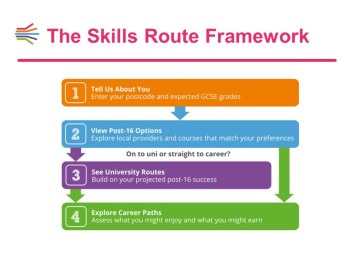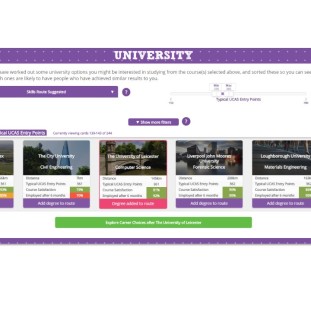Skills Route: Using wellbeing data to help young people make more balanced decisions
How did you decide what to study in your final years of school?
Perhaps you picked the subjects taught by your favourite teachers; maybe you picked the subjects that came most easily to you or you might even have had a clear career or study goal which you were working backwards from.
Let’s take this a little further, cast your mind back to when you were 16. Your hormones were probably raging and if you were anything like me, you were more interested in sport, shopping and socialising than in serious study decisions. Nonetheless, the choices that you make at the age of 15 and 16 about what to study in sixth form set the stage for many future opportunities. That is not to say you can’t change track later in life but for many, the choice between sciences and arts or humanities and sport is the first decision on the road to a salaried job and/or university.
So who or what helped you with this decision?
There might have been a trusted careers
advisor in school, a psychometric test, some work experience or a recommendation from a family friend that was central to your decisions – but was there any hard data? There is a substantial community of careers advisors in the UK. All those practitioners offering careers support are encouraged to provide insights into local labour market intelligence (amongst other things).To help them with this work, there is a growing market of data-driven tools designed to help young people to select the right courses at the right University or Apprenticeship to match their interests.
Skills Route has been developed by a team of education data consultants to help young people, careers advisers, teachers and parents make informed decisions about what to study in sixth form to ensure their long term goals are not compromised. It equips users with the data that can help inform their decision making, particularly when used in combination with face to face careers advice and support. Skills Route brings together data about all the available options into one place, personalising the information, and highlighting the potential impact on a user’s salary, onward study, career and wellbeing.
And this is where the data comes in. Since 2015, the What Works Centre for Wellbeing has highlighted a number of interesting datasets exploring trends in wellbeing including how wellbeing relates to employability and the impact it can have on staff engagement for example. One such dataset expands the relative wellbeing of people in different professional occupations and this enables us to help our users benefit from a metric of success that is otherwise difficult to quantify.
By including this data, we have found that young people are able to better reflect on their own personal drivers for the future – whether money, happiness, likely employment or something less quantifiable. Furthermore, where potential salary is increasingly assumed to be the main driver for a young person’s decisions, this dataset allows the user to challenge and weigh up the relative benefit – is it worth earning a great salary as a broker if my wellbeing will suffer as a result? By including data such as this, we hope to increase the proportion of young people pursuing jobs for their wellbeing not just for their earning potential.





